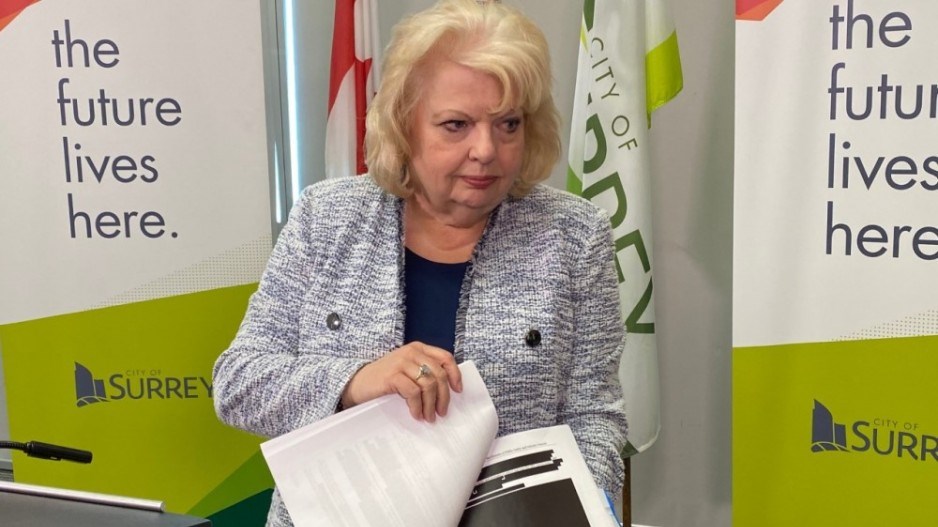Surrey Mayor Brenda Locke announced Friday the city has launched a petition in Supreme Court of B.C. for a judicial review of the provincial government's July 19 decision to continue the police transition from Surrey RCMP to the presently nascent but growing Surrey Police Service (SPS).
Locke cited concern for a major increase in municipal taxes to pay for the ever-increasing costs of the police transition.
“My team and I were elected to stop the proposed police transition,” said Locke, in a statement.
“Surrey simply cannot accept the extraordinary burden that our taxpayers will face as a result of a provincial order that will not deliver any public safety benefit,” added Locke, who was elected in October 2022, in place of SPS proponent and former mayor Doug McCallum.
Solicitor General and Public Safety Minister Mike Farnworth announced in the summer that the province would only accept a continued transition, despite a plan to reverse McCallum’s plan, which continues to face significant delays in reaching a full complement of officers.
In response to the petition, Farnworth issued a statement of his own on Friday, saying Surrey has chosen to spend money on litigation and potentially “further delay” the transition.
“As solicitor general, the decision to direct Surrey to continue the transition to the SPS was made within my responsibility to ensure community safety for people in Surrey and all of British Columbia. It was made after careful consideration of all the information provided by the RCMP, the city, and the SPS, and it was not made lightly,” said Farnworth.
The minister said he will be introducing legislation Monday “that will provide clarity to the people of Surrey, and will provide a clear process for any municipality that wants to change its police of jurisdiction.”
It’s unclear how this may impact the city’s petition.
Hired as an advisor last year to devise a plan to keep the RCMP, lawyer and the province’s former top RCMP commissioner Peter German will also be advising the city on the petition and judicial review, if approved by the court.
German addressed media at city hall on Friday but provided few details, saying he could not speak to the court process.
German called the city’s reversal plan “sensible.”
“The warnings about higher costs and inability to recruit frontline officers for the Surrey Police Service have all come true, and the city has an obligation to act in the public interest,” said German in a statement.
German declined to say how much the city was paying him and how much the litigation could cost; rather, he said the extra SPS one-time transition and operational costs pale in comparison to the legal manoeuvre.
The city’s petition was filed by Dennis James Aitken LLP and Hunter Litigation Chambers.
While the province has offered $150 million of provincial revenues to cover some of the transition costs, the city claims in its petition that taxpayers will need to expend in excess of $464 million over the next 10 years to transition the force — thus there is a $314-million shortfall. (This includes a $31.9-million additional annual operating cost for SPS.)
German said the central argument for the city is that the province has no right to choose the type of force to police a city — that right rests with the city.
Farnworth, as noted, has claimed the transition to SPS is the safest route and the province is responsible for public safety.
The city’s petition, however, claims “the city has at all material times provided adequate and effective policing” and the minister has never notified the city of concerns otherwise.
Right now, the RCMP remains the “police of jurisdiction” (POJ) as a majority of officers remains Mounties. The city claims just 200 SPS officers are on patrol whereas SPS claims 246 are deployed (such discrepancies have been the norm) with 339 total officers on payroll.
As such, SPS officers are working alongside the RCMP and their numbers are expected to grow until there comes a time when the SPS becomes the POJ.
Surrey’s combined police force is 760 officers, meaning anywhere from 514 to 560 officers remain Mounties.
SPS figures show the progression of officers: last January, SPS reported 205 officers with so-called boots on the ground and 333 total on payroll.
“Since the July decision, no or only limited material steps have been taken towards transitioning the SPS,” the city stated in its petition.
Locke says the transition is costing the city about $8 million more per month to pay for the extra SPS officers who haven’t been deployed but are on payroll (understood to be doing policy or administrative work). Those costs were never contemplated when the transition was approved in 2019.
“The SPS has hired an additional 132 officers that are receiving full compensation but have not been deployed, greatly adding to the significant financial burden faced by the City of Surrey,” said Locke in a public letter to Farnworth Friday.
“That is why the City put forward a sensible and affordable plan earlier this year to end the proposed transition and maintain the RCMP as the police of jurisdiction in Surrey,” said Locke.
The mayor added that the transition is destabilizing other police forces around B.C. as SPS recruits those officers.
Locke initially voted to switch the force in November 2018 alongside political partner McCallum; the two split in 2019 with Locke calling the process untransparent. Much acrimony ensured between the two in the following years and Locke displaced McCallum as mayor with 28 per cent of the vote compared to the incumbent’s 27.3 per cent (a margin of just 973 votes).




